How to Shorten a Dress Without Sewing – 13 Working Methods
Are you tired of having dresses that are too long for your liking? Do you wish to shorten a skirt without the hassle of sewing? Well, you’re in luck!
In this guide, I’ll walk you through simple and effective methods to shorten a dress without sewing.
Whether you want to transform a formal gown or a casual summer dress, these techniques will help you achieve the perfect length. So let’s dive in!
How to Shorten a Dress Without Sewing – Step By Step
Having a dress that is too long can be frustrating, but you don’t always need to sew to achieve the desired length.
With the right tools and techniques, you can easily shorten a dress without sewing.
This article will provide step-by-step instructions on simple, effective methods requiring no sewing skills.
Method 1: Using Fabric Tape
Fabric tape is a handy tool for securing hems without sewing. To shorten a dress using fabric tape, follow these steps:
- Measure the desired length and mark it on the dress.
- Fold the excess fabric to the inside of the dress.
- Apply fabric tape along the folded edge, following the marked line.
- Press firmly to ensure the tape adheres properly.
- Repeat the process on all sides of the dress.
- Using fabric tape provides a temporary solution that holds well but can be easily removed.
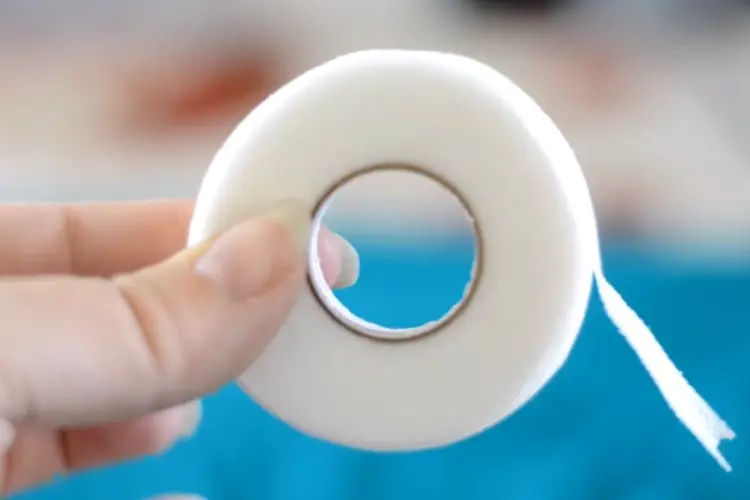
Method 2: Using Hemming Tape
Hemming tape is another excellent option for shortening a dress without sewing. Here’s how to do it:
- To get started, measure and sketch the desired length of the dress.
- Fold the excess fabric to the inside of the dress.
- Place the hemming tape along the folded edge, following the marked line.
- Iron the video on medium heat, pressing firmly.
- Repeat the process on all sides of the dress.
- Hemming tape provides a strong bond and creates a clean hemline without sewing.
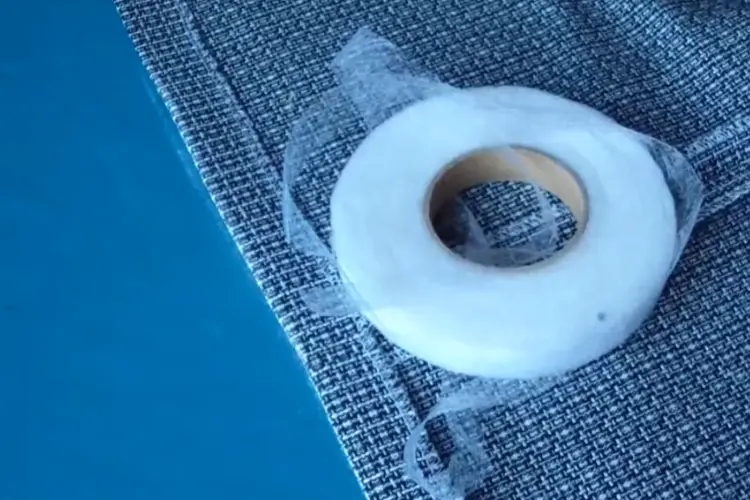
Method 3: Using Fabric Glue
Fabric glue is a convenient alternative for shortening a dress without sewing. Follow these steps:
- Estimate and draw the preferred length of the dress.
- Fold the excess fabric to the inside of the dress.
- Apply fabric glue along the folded edge, following the marked line.
- Press firmly to secure the material together.
- Repeat the process on all sides of the dress.
- Fabric glue offers a secure hold, but choosing a high-quality, washable glue suitable for fabric is essential.
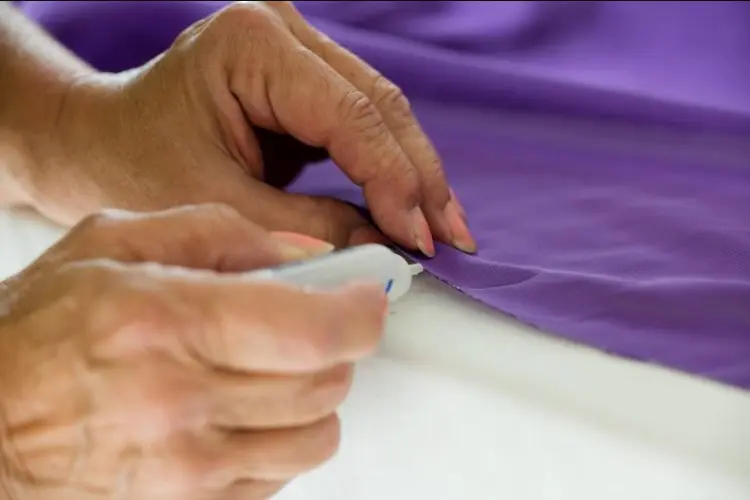
Method 4: Using Safety Pins
Safety pins can come to your rescue if you’re looking for a temporary solution to shorten a dress. Here’s how to use them:
- Please put on the dress and decide on the preferred length.
- Lift the skirt to the desired size and secure it with a safety pin.
- Make sure the plug is securely fastened and hidden within the fabric folds.
- Repeat the process on all sides of the dress.
- Safety pins offer a quick and adjustable option, allowing you to change the length as needed.
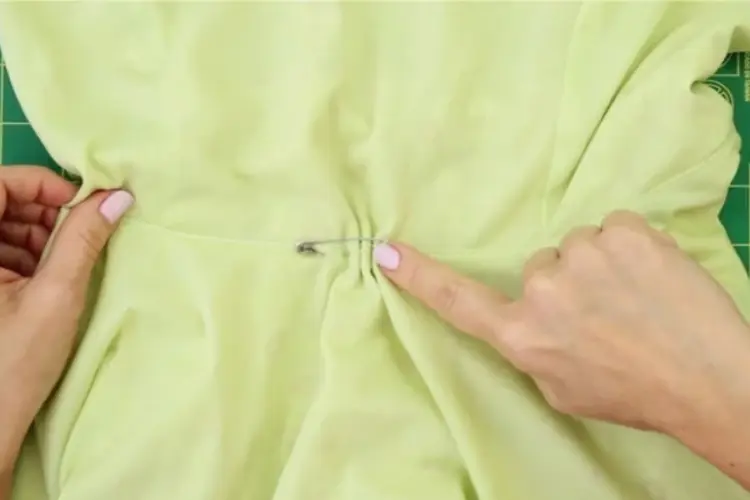
Method 5: Using a Belt or Sash
Adding a belt or sash to your dress can shorten it and create a stylish look. Follow these steps:
- Please put on the dress and decide on the length you would like.
- Wrap a belt or sash around your waist at the desired height.
- Gather the excess fabric of the dress and tuck it into the belt or sash.
- Adjust the folds until you achieve the desired length and a neat appearance.
- Using a belt or strap adds a touch of personal style while effectively shortening the dress.
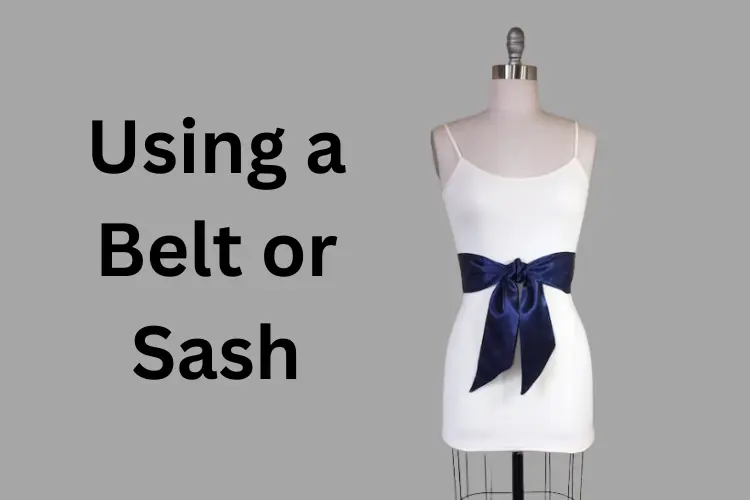
Method 6: Using Elastic Bands
Elastic bands can be a practical solution to shorten a dress without sewing. Here’s how to do it:
- Estimate and mark the chosen length on the dress.
- Fold the excess fabric to the inside of the dress.
- Secure the folded edge with an elastic band placed at the marked line.
- Adjust the tension of the elastic band to achieve the desired length.
- Conceal the elastic band by adjusting the fabric folds.
- Using elastic bands allows for flexibility in changing the dress length and provides a comfortable fit.

Method 7: Tying a Knot
Tying a knot can shorten a dress for a casual and trendy look. Follow these steps:
- Put on the dress and decide on the length you would like it to be.
- Lift the skirt to the desired height and gather the fabric on one side.
- Tie a knot with the collected material, securing it firmly.
- Adjust the knot and fabric folds until you achieve the desired length and style.
- Tying a knot shortens the dress and adds an exciting detail to your outfit.
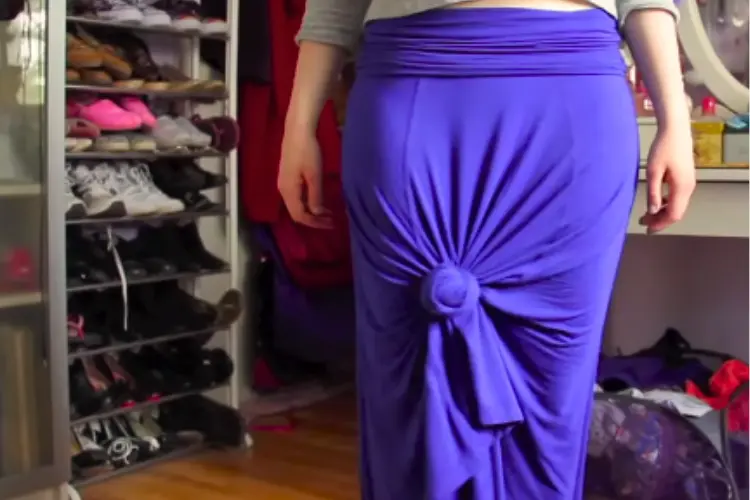
Method 8: Layering
Layering is a creative way to shorten a dress while adding visual interest. Here’s how to do it:
- To determine the desired length, put on the dress.
- Pair the dress with a shorter skirt or slip that complements its style.
- Let the faster layer show at the bottom of the dress.
- Adjust the length of the more quick layer to reach the expected overall length.
- Layering allows you to customize your clothing size while creating a unique and stylish look.
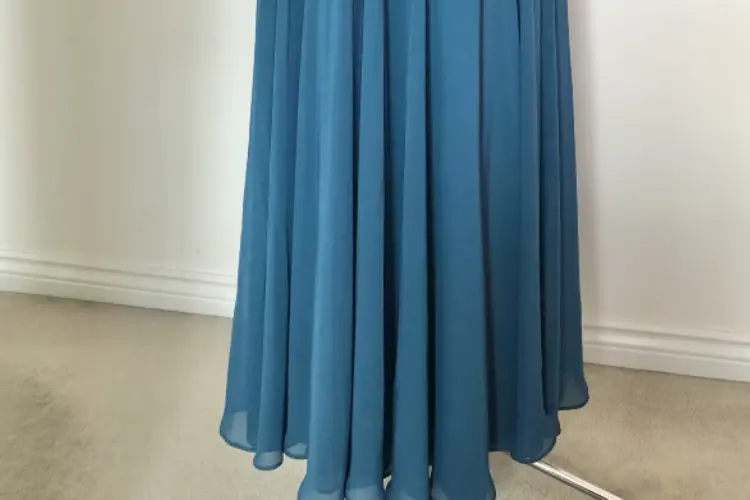
Method 9: Ruching
Ruching is a technique that involves collecting and sewing fabric to create decorative wrinkles. Follow these steps:
- Put on the dress and select the desired length.
- Gather the excess material on one side and create small creases.
- Attach the pleats by hand-sewing them in place.
- Repeat the process on all sides of the dress.
- Ruching shrinks the clothing and adds surface and size to the general strategy.
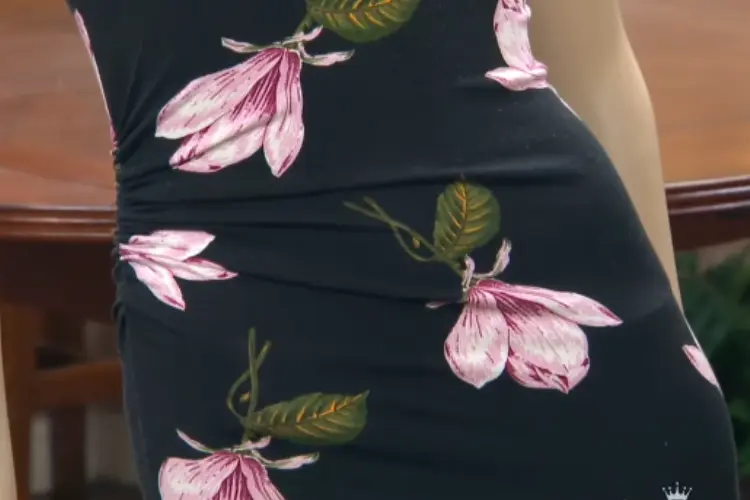
Method 10: Tucking and Folding
Tucking and folding the excess fabric is a simple yet effective way to shorten a dress. Here’s how to do it:
- Please wear the clothing and let me know your preferred length.
- Fold the excess fabric to the inside of the dress.
- Tuck and fold the fabric in small increments until the selected size is acquired.
- Adjust the folds to create a clean and polished look.
- Tucking and folding provide a quick solution to shorten a dress without needing any tools or materials.
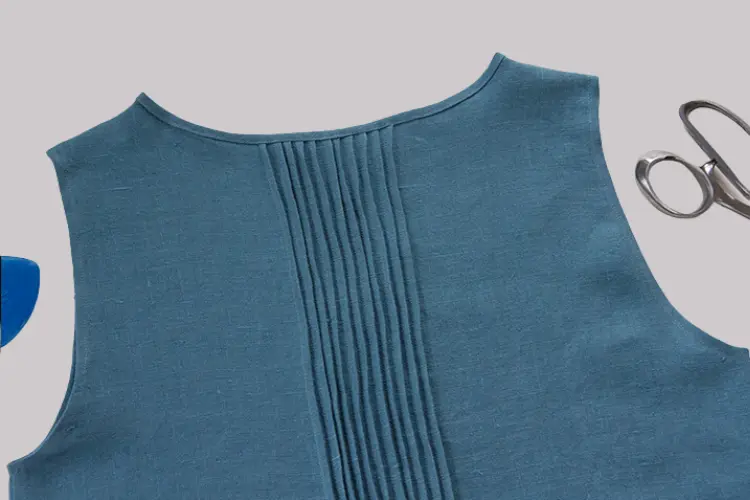
Method 11: DIY Fringe Hem
Creating a fringe hem is a stylish way to shorten a dress while adding a playful touch. Follow these steps:
- Put on the dress and determine the desired length.
- Measure and mark the desired height on the dress.
- Cut vertical slits along the hemline, starting from the marked line.
- Pull on the fabric strips to create a fringed effect.
- Repeat the process on all sides of the dress.
- DIY fringe hems are trendy and bohemian, perfect for casual and summer outfits.
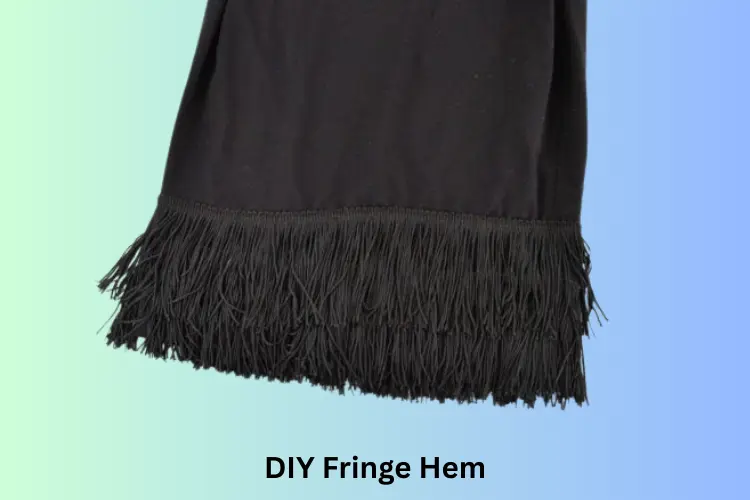
Method 12: Using Iron-on Patches
Iron-on patches can be used creatively to shorten a dress and add decorative elements. Here’s how to do it:
- Put on the dress and decide on the length you want.
- Measure and mark the desired length of the dress.
- Apply iron-on patches along the hemline, following the marked line.
- Iron the patches according to the manufacturer’s instructions.
- Repeat the process on all sides of the dress.
- Iron-on patches allow you to customize the dress length while incorporating unique designs and patterns.
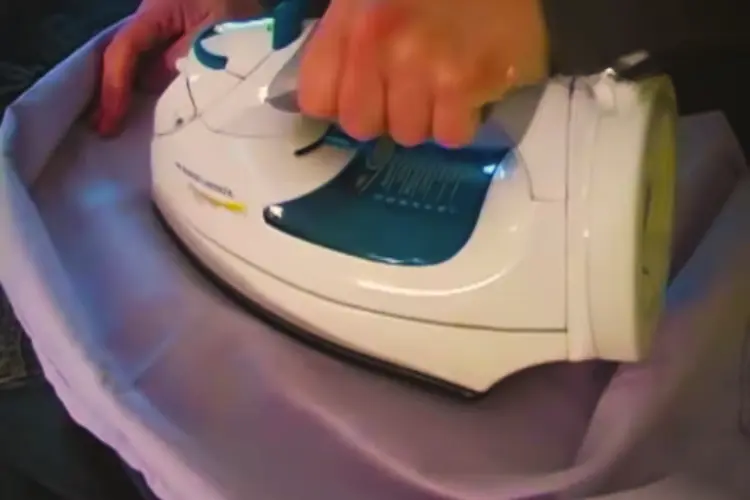
Method 13: Using a Wrap or Overlay
Adding a wrap or overlay to a dress effectively shortens it while creating a layered look. Follow these steps:
- Let’s put on the dress and decide on the length you prefer.
- Find a lightweight fabric or a matching overlay.
- Wrap the fabric or overlay around the clothing, starting from the waist or hips.
- Adjust the fabric folds until you achieve the desired length and style.
- Using a wrap or overlay provides versatility in adjusting the dress length while adding a touch of elegance.

Conclusion
Shortening a dress without sewing is an accessible and practical solution for achieving the perfect length.
From fabric and hemming tape to safety pins and creative techniques like layering and ruching, there are various methods to choose from.
Following the step-by-step instructions in this guide, you can confidently transform your dresses to suit your style and preferences.
Check the related video on the Sewway channel. Watch this video after 35 seconds:
Frequently Asked Questions FAQs
Yes, most of the methods mentioned in this guide are reversible, allowing you to restore the original length of the dress when needed.
No, high-quality fabric tape and adhesive are designed to be removable without leaving any residue or causing damage to the fabric.
Yes, the practices described in this guide can be applied to various dress styles, fabrics, and lengths.
The duration of quick answers may vary depending on the materials’ quality and the activity level while wearing the dress. It’s recommended to check and readjust as needed periodically.
While these methods offer practical solutions, they may need to be more suitable for complex alterations or heavily structured dresses. In such cases, it’s advisable to consult a professional tailor.
